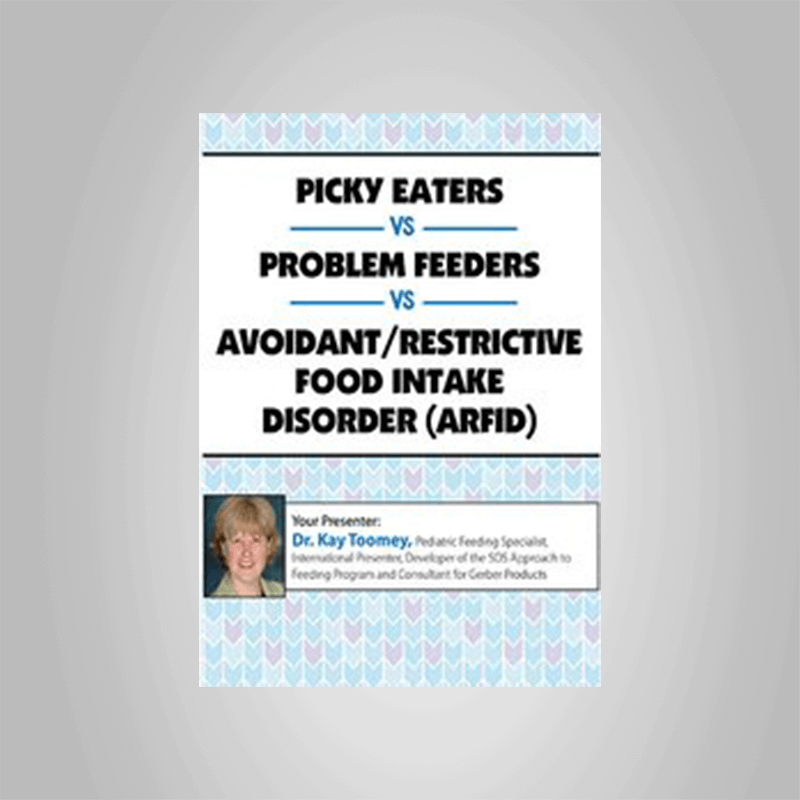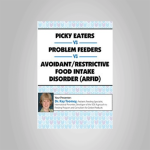Dr. Kay A. Toomey – Picky Eaters vs Problem Feeders vs Avoidant/Restrictive Food Intake Disorder (ARFID)DescriptionPediatric feeding disorders make it difficult or impossible for a child to eat, drink, or digest food normally, often compromising their health and development.The limited intake seen in these children reflects concern such as:Food aversionsLack of interest in eating or foodAvoidance based on sensory characteristics of foodFear of choking or other adverse consequencesSerious medical and psychological complications consist ofSevere malnutritionGrowth failureMarked interference with psychosocial functioningWatch feeding expert, Dr. Kay Toomey, who has over 30 years of clinical experience assessing and treating children with a wide range of feeding challenges. She will show you clear guidelines to utilize the appropriate therapy approach.Learn practical therapeutic interventions to use with children from each diagnostic group and ways to improve family meal routines and increase children’s intake of more nutritious foodsIdentify physical, motor, sensory, oral-motor, environmental, nutritional and behavior factors necessary to consider, to properly assess feeding problems.Delineate differential criteria for determining a child’s diagnosis as a typical eater, picky eater, problem feeder or a child with ARFID.Learn when to refer to a specialist for additional treatment.Change the lives of the children you work with…purchase this recording today!HandoutsManual – Picky Eaters vs Problem Feeders vs ARFID (1.9 MB) 115 Pages Available after Purchase Instructions for ASHA credit – Self Study (64.4 KB) Available after Purchase Commission on Dietetic Registration (CDR) Certificate Instructions (163.1 KB) Available after PurchaseOutlinePrevalence of the Problem Picky eatingProblem feedingARFIDThe Complexity of Feeding/Eating 7 areas of human functionHow children learn to eat (or not)How to Complete a Comprehensive Feeding AssessmentMedical/organsOral-motor skillsSensory-motor skillsPostural and motor skillsNutritionLearning/cognitionEnvironmentDifferential Diagnoses Criteria, Research and Limitations Picky eatingAble to tolerate new foods on plateDecreased range or variety of foods that will eatFrequently eats a different set of foods than the rest of the familyProblem feedingRestricted range or variety of foodsRefuses entire categories of food texturesCries and “falls apart†when presented with new foodsARFIDAccept a limited diet in relation to sensory featuresFood refusal is related to aversive or fear-based experiencesExtreme pickiness; distractible and forgetfulTreatment Approaches – Align Treatment w/DiagnosisSystematic desensitizationFlooding/escape extinctionEating disordersCase Studies: When Assessments Go Well, and When They Don’tPicky eating –Case 1 = 2 ½ year old male with limited number of accepted foods he will eat, variable eating from one day to the next, issues staying at the tableCase 2 = 2 ½ year old female with restricted food range, over reliance on liquids for calories and swallowing assistanceCase 3 = 9 year, 8 month old male with lack of healthy proteins per parents, and no vegetables in his food rangeProblem feeding –Case 1 = 3 year, 10 month old female with a G-tube, born at 26 weeks gestation, complicated medical historyCase 2 = 4.25 year old female born with congenital Rubella, poor weight gain, restricted food range, episodes of gagging and coughing, episodes of refusing to eatARFID –Case 1 = 15 year old male with chronic “chok-y†sensation, significant weight loss, hospitalized in an Eating Disorders programCase 2 = 13 year old male with difficulties eating food at school, restricted food range per parental report, refusal to eat vegetablesPractical Feeding Strategies for Pediatric Feeding DisorderRoutines and environmental supportsMatching foods to a child’s skillsetReinforcementManagement of maladaptive behaviorsWhen to ReferRed FlagsPicky Eater vs Problem Feeder criteriaFacultyDr. Kay A. ToomeyToomey & Associates, Inc.Dr. Kay A. Toomey, is a pediatric psychologist with over 30 years of clinical experience assessing and treating children with a wide range of feeding challenges. She developed the SOS Approach to Feeding as a family-centered program for assessing and treating children with feeding problems. Dr. Toomey helped to form The Children’s Hospital – Denver’s Pediatric Oral Feeding Clinic, as well as the Rose Medical Center’s Pediatric Feeding Center. She also acts as a consultant to Gerber Products.Dr. Toomey co-chaired the Pediatric Therapy Services Department at Rose Medical Center prior to entering private practice. She acted as the Clinical Director for Toomey & Associates, Inc.’s Feeding Clinic for six years and SOS Feeding Solutions at STAR Institute for eight years, and speaks nationally and internationally about her approach. Dr. Toomey is currently the president of Toomey & Associates, Inc., and acts as a clinical consultant to the Feeding Clinic at STAR Institute.Speaker Disclosures:Financial: Kay Toomey is in private practice. She receives a consulting fee from Nestle Infant Nutrition/Gerber division. She receives a speaking fee from Education Resources, Inc.; and SPD Foundation/STAR Institute. Dr. Toomey receives a speaking honorarium from PESI, Inc.Non-financial: Kay Toomey is a member of Feeding Matters.
 Dr Robert Anthony – Zero Resistance Weight Release
₹2,656.00
Dr Robert Anthony – Zero Resistance Weight Release
₹2,656.00
 Dr. Robert Morrison – Applied Kinesiology Manual Muscle Testing
₹5,976.00
Dr. Robert Morrison – Applied Kinesiology Manual Muscle Testing
₹5,976.00
Dr. Kay A. Toomey – Picky Eaters vs Problem Feeders vs Avoidant/Restrictive Food Intake Disorder (ARFID)
₹5,810.00






